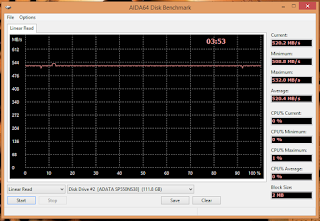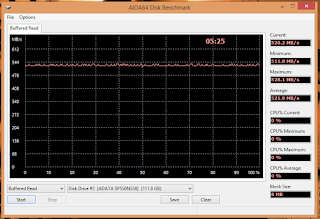ADATA is a name that any PC enthusiast must be familiar with due to their wide range of storage and memory devices that strike an impeccable balance between price and performance. We've been reviewing their products for a while now and rarely have we felt the need to complain about anything so our words are from experience and not just a pass on advertisement.
Today we have with us the ADATA Premier SP550 M.2 120GB SSD. Yes you guessed it right that its the M.2 version of their very own SP550 2.5' SSD!
The sole purpose of this SSD is to bring the advantages of a M.2 form factor SSD to a majority of population as its priced really strategically with the 120GB version that we have today priced merely at Rs 3500 in India! Rest the drive is based on the same technology that its 2.5' cousin is based upon ranging from the TLC NAND to the Silicon Motion controller.
Packing and Contents
With the SP550 M.2 ADATA has brought in a welcome change to their packing style and shifted to a glossy multi-color packaging from the plain white one. The front clearly specifies the drive capacity, the brand logo and a big product image along with the product name at the bottom left corner.
On the back nothing much is printed except for the product name and vital details such as the various contact details to the ADATA customer care service.
Open the box and you'll find just the SSD securely packed in a plastic retainer. No manual or installation guide is provide along which is acceptable since no one needs it now.
Overall the packing is clean, simple and informative with nothing to complain about.
Closer Look
Looking at the Premier SP550 you'll notice that its small, I mean like very very small! It complies with the 2280 form factor & hence, measures at just 22mm x 80mm x 3.5mm. Its a good thing since most motherboards only support M.2 drives of upto 80mm in length making the ADATA SP550 M.2 quite a universally compatible drive.
Flip the drive and you find two 16nm 128Gbit TLC NAND memory chips manufactured by Sk Hynix. These chips are 30GB each and are four in number, two at the bottom and two on the top of the PCB, giving the drive its totla 120GB memory capacity.
Since ADATA bins and stress tests these chips on their own for their products they bear the name of ADATA instead of Sk Hynix!
The controller is a Silicon Motion SM2256KAB. The SM2256 is a 4-channel IC using a 32-bit RISC CPU supporting 2D/3D MLC and TLC NAND as well as AES 256, TCG and Opal encryption for added security and it also supports the DevSleep ultra-low power state.
The controller also has proprietary NANDXtend error-correcting and data protection technology built in, which along with LDPC (low-density parity check) and RAID Data Recovery technologies help prolong the TLC NAND’s endurance.
Besides, the SP550 drives use pseudo-SLC caching to ensure high writing performance as well as a dedicated 256 MB of DDR3 DRAM cache. The module used is the Nanya NT5CC128M16IP-DI IC and is DDR3L-1600 with 11-11-11 timings.
Test Setup and Benchmarks
We used our usual testbench to benchmark the ADATA SP550 M.2 SSD.CPU: Intel Core i7 5930K OC at 4.5Ghz on all six cores
Motherboard: Gigabyte X99 Gaming 5P
RAM: Kingston HyperX Predator 16GB DDR4 (4x4) 3000Mhz Memory Kit
Cooler: Corsair H100i GTX
Graphics Card: Asus STRIX RX 480 8GB OC DDR5
Storage: Adata SP550 M.2 120GB SSD
Power Supply: Corsair AX860i 860W 80+ Platinum
OS: Windows 8.1 Pro 64-bit
The drive was easy to fit in and installed without a problem. Following our usual SSD testing methods we formatted the drive and put it as a secondary drive with our main SSD loaded with Windows 8.1 Pro 64-bit. The entire test suite was run twice to obtain the best possible reading, each session performed after a fresh system restart. Out of the 120GB promised only 112GB on this drive is usable so around 6.6% of the total space is reserved for memory buffer.
ATTO Disk
ATTO Disk Benchmark measures transfer rates across specific lengths for any storage system. ATTO uses RAW data, I set my transfer size from 0.5 to 8192kb. This is generally the most reliable benchmarks for today's SSDs.As we can see the drive is hitting the exact advertised speed over here with 556Mb/s read speed though 362Mb/s write speed is a bit lower than the 410MB/s mark.
CrystalDiskMark 5.0.2
CrystalDiskMark is a disk benchmark software that analyses different types of hard drive. Giving sequential benchmark write and read statistics in MB/s. A simple program that is very useful.The read/write speed again can be seen in almost coherence with our previous tests.
Anvil Storage Utility
The next test is Anvil Storage Utilities, which is a really great piece of software. The SSD benchmark gives you scores for both read and write as well as a combined score.Anvil also includes Threaded IO tests, which test IOPS. We ran both the random read and random write tests. The results are below.
AS SSD
The AS SSD software determines the performance of Solid State Drives (SSD). The tool contains five synthetic and three practice tests. The synthetic tests determine the sequential and random read and write performance of the SSD. These tests are performed without using the operating system caches. In Sequential tests, the program measures the time it takes to read and write a 1 GB file respectively.From the images its clear that the SSD not only hits great speeds in the benchmark but also the copy benchmark shows respectable speeds which is something most consumers will be interested in.
AIDA64 Extreme Edition v5.60
AIDA64 is one of the best tools out there to check the system stability, error diagnostics and even to validate overclocking.It has a set of suites for almost every hardware out there including SSD/HDD. So we started of with AIDA64 disk suites.
As we can see that the drive is hitting great speeds and is quite consistent in read and write activities.
HD Tune Pro
HD Tune Pro is one of the most popular hard drive software suites available. It has many different benchmarks and tests built into it. Our first test is the read benchmark, which tests the average read speed and access time of the drive.It was necessary to use it even after so many tests just to give all of you a graph of how constant the speed is on this SSD as many SSDs tend to fluctuate on the read/write speed which ultimately gives you unstable performance.
At 354.5Mb/s average read speed and a very consistent graph the drive is definitely performing well.
PCMark Vantage
We used the PCMark Vantage HDD test which is one of the best range of test suits out there for measuring the performance of any HDD/SSD. Tests are conducted by simulating real life tasks such as Windows Start up, Gaming etc.
With 78413 as the total score and minimum speed at 297.22Mb/s in the 'application loading' test the drive comes up with some very impressive stats. This is important since these are emulation of real life usage!
My Verdict
Alright so this one is pretty straight forward, the ADATA Premier Pro SP550 M.2 SSD might not be your ground breaking-record shattering SSD to make your friends and neighbors go green with envy but it is in fact one of the best performing M.2 SSDs in the budget segment.
The controller does fumble in synthetic benchmarks during read speeds but performs better than many of the more expensive drives in real life emulation tests such as PCMark Vantage and AS SSD. One thing worth noticing is that the drive performs better when occupied rather than being empty as the SM2256KAB controller has this tendency and since its a 120GB drive reaching its full or near full capacity won't be an issue for many! Also since its affordable and low on power consumption it makes a perfect upgrade option for most of the laptop owners out there who are looking for an upgrade to their primary drive over the conventional mechanical drive.
I give it a 8/10 and hence the ADATA SP550 M.2 SSD ears our Gold Award!












































0 comments:
Post a Comment